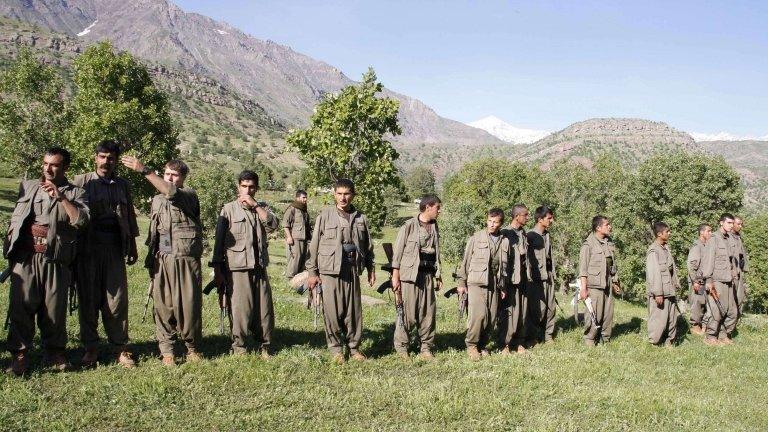Is Turkey's peace process with the Kurds collapsing?
- Published
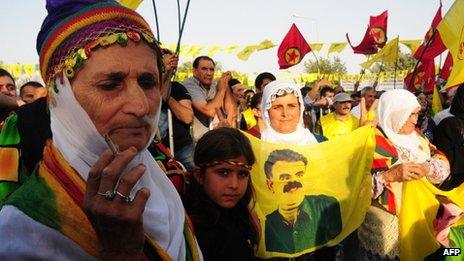
Kurdish activists celebrated Peace Day this month but hopes for an end to hostilities are fading
The Kurdish rebel PKK's announcement that it is ending its withdrawal from Turkey casts doubt on a peace process that many had hoped was the best chance yet of ending a 30-year conflict. Mahmut Hamsici, of BBC Turkish, reports from PKK camps in northern Iraq.
Devrim, a PKK fighter, joined the organisation in the mid-1990s.
After a long period spent in the mountains of Turkey, she pulled back to Iraqi Kurdistan two months ago as part of the PKK's withdrawal from Turkish soil.
The deserted mountains of Iraq's Behdinan region, running along Turkey's south-eastern border, are now home to PKK camps and groups of fighters like Devrim.
After three decades and more than 40,000 deaths, a new peace process was launched in March.
As part of this process, the PKK - regarded as a terrorist organisation by Turkey, the EU and US - declared a ceasefire and started its withdrawal in May.
'No reciprocation'
Speaking before the group announced the suspension of its withdrawal on Monday, Devrim expressed her frustrations.
"We had mixed feelings while we were withdrawing. We had worries like: We are withdrawing but is the government sincere or not?" Devrim tells me.
Her worries deepened, she said, when the government took no reciprocal steps, and instead accused the PKK of not withdrawing properly.
In another part of Iraqi Kurdistan, in the Qandil mountains, considered the base of the PKK, the organisation's de facto leader Cemil Bayik says the process is sliding into collapse and accuses the Turkish government of failing to take steps of its own.
"We released the prisoners in our hands without asking for anything in return. We declared a ceasefire without asking for anything in return. We took practical steps towards ending the war, and withdrawing from the north to the south. We completed the first phase of the process successfully," he complains.
"However, when the time came for the Turkish state to take steps - that is in the second phase - the Turkish state did not take any steps and started making excuses."
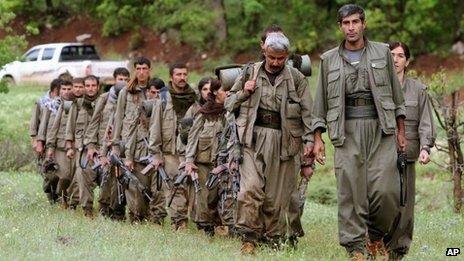
Kurdish rebels began crossing from Turkey into Iraq in May
However, Turkish Prime Minister Recep Tayyip Erdogan turns the blame back on the PKK.
"The promises made to withdraw from Turkish soil have not been fulfilled. Only 20% have left Turkey, and they are mostly women, elderly people, children," he said recently.
'No mother tongue'
On Monday Turkish Deputy Prime Minister Bekir Bozdag dismissed the rebels' move, and said Turkey would take its own moves towards peace.
"Whatever the terror organisation does is up to them. But Turkey will do whatever needs to be done," he said.
The government has said it is working on a package of democratic reforms, but it has not yet brought them to parliament.
The PKK's Cemil Bayik defends the withdrawal, saying no date was set in the agreement for its completion.
He also criticises the government's "democratisation package" - claiming that the government has prepared it without talking to the Kurdish side - and the failure to establish the Kurdish language as a Turkish "mother tongue".
The PKK wants to see progress on a range of measures to maintain confidence in the peace process, including: an end to construction of new gendarmeries and dams in Kurdish areas; an improvement in the prison conditions of leader Abdullah Ocalan; and releasing thousands of imprisoned Kurdish politicians.
Mr Bayik blames the government: "They are preparing for war, not peace. Indeed, they are preparing for a big war. We know this. They want to strike a big blow."
He says Mr Erdogan's government is not committed to solving the Kurdish question, but simply "wants to gain time in order to win municipal elections and follow that up with wins in parliamentary and presidential elections".
The PKK has suspended withdrawal but pledges to maintain a ceasefire for now.
Pessimism spreading
Turkish government officials, meanwhile, say the process continues and that it is the PKK creating tension.
But pessimism is spreading.
Selahattin Demirtas, leader of the pro-Kurdish Peace and Democracy Party, said their hopes for the process had decreased 90% since it started.
As the process is based on talks between the imprisoned Ocalan and governmental officials, there is no third party, no public agreement, and the process is full of obscurities.
But it seems clear that the process has hit a crisis.
Back in the PKK camps in northern Iraq, PKK fighters are waiting to see what happens next.
When asked if they are ready to start fighting again, they all answer the same.
One, named Engin, says: "Of course. We are a military organisation... if we are not left any other solution, we are ready to fight."
But, as his colleague Devrim says, there is still hope.
"Hope exists until the last moment... Everything can change even in 24 hours."
She said it just depended on the government making "a serious and sincere approach".
- Published4 November 2016
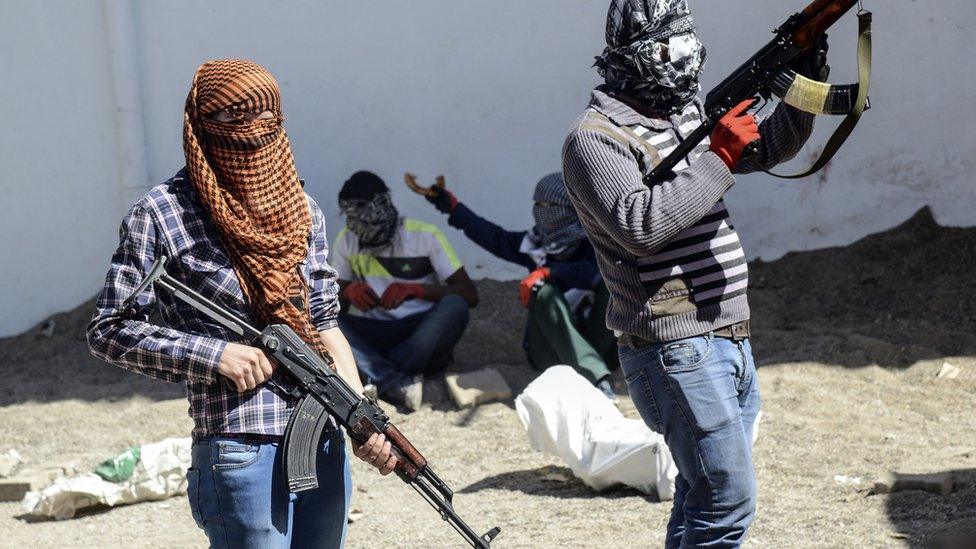
- Published19 July 2013
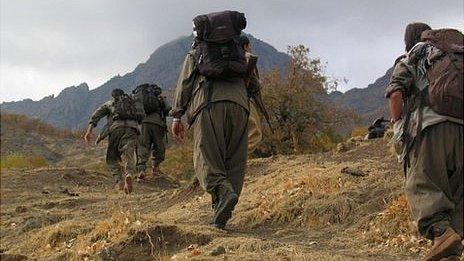
- Published25 April 2013
